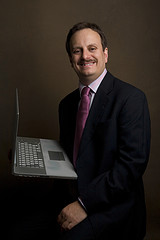The sessions I have selected to present explore the use of computers as intellectual laboratories and vehicles for self-expression. I will share video-based examples of students from 5-adult learning in remarkable ways with computational material and encourage you to reflect upon your own practice.
It is my sincere desire to add a unique voice and perspective to the important discussions about to commence in Shanghai. I look forward to learning with all of you.
Ten Things to Do with a Laptop – Learning and Powerful Ideas
A paper entitled, “Twenty Things to Do with a Computer,” was published in 1971 by Seymour Papert and Cynthia Solomon. Few of today’s schools, with or without laptops, satisfy the goals of that thirty-five year-old document. This keynote invokes the challenging vision of the earlier document, updates it and presents ideas for using laptops in ways that offer unprecedented learning adventures across K-12 and various subject areas. A broader vision of using computers as intellectual laboratories and vehicles for self-expression is equally appropriate for educators with one or one hundred computers in their classroom.
Way Beyond Web 2.0
Blogging is undoubtedly cool and has captured the imagination of many educators. It can even be an effective classroom tool. However, the irrational exuberance granted blogging and other Web 2.0 tools perpetuates the dominant view that computers are best used for research purposes and that learning is about information. This misunderstands the nature of learning and underestimates the potential of computing in the intellectual and creative development of children. Such thinking deprives students of rich opportunities to construct modern knowledge in a wide variety of domains. We must explore a more expansive role of computers in areas such as math, science and the arts where learning opportunities abound yet elude far too many children.
We best serve our students when we teach them how to solve problems we can’t even anticipate. This presentation will illustrate how the web may be used for rich authentic intellectual inquiry in order to solve sophisticated problems in an increasingly complex world. Teachers will be inspired to look for such opportunities in their daily lives and demonstrate how a good prompt or interesting observation can lead to sophisticated thinking. Recommended software environments will be demonstrated along with strategies for getting a greater return on investment out of school technology. Examples from actual K-12 classrooms will be shared. Bring your laptop to join in the learning adventure!
Papert Matters – Children, Computers and Powerful Ideas
Seymour Papert, often referred to as the “father of educational technology,” is arguably one of the most important thinkers of the past half-century. His work and ideas influenced Jean Piaget as well as the fields of artificial intelligence, computer science, mathematics, educational computing, learning and school reform. On a tangible level, Logo, LEGO robotics, constructionism, the $100 laptop, Hypercard, Squeak, Scratch, laptops for Maine students and many of the best ideas in educational technology were shaped by Papert’s vision of children constructing modern knowledge. This session presents just a few of Professor Papert’s most powerful ideas about children, computers and learning through his own words and rarely seen video. The presenter worked closely for Dr. Papert and was the principal investigator on his most recent institutional learning project. Educators new to Papert’s theories will be challenged to think deeper about learning. Veteran educators will be inspired to reinvigorate their practice and challenge the status quo.
Veteran educator Gary Stager, Ph.D. is the author of Twenty Things to Do with a Computer – Forward 50, co-author of Invent To Learn — Making, Tinkering, and Engineering in the Classroom, publisher at Constructing Modern Knowledge Press, and the founder of the Constructing Modern Knowledge summer institute. He led professional development in the world’s first 1:1 laptop schools thirty years ago and designed one of the oldest online graduate school programs. Gary is also the curator of The Seymour Papert archives at DailyPapert.com. Learn more about Gary here.


Be great if these were recorded??
I’ll try.